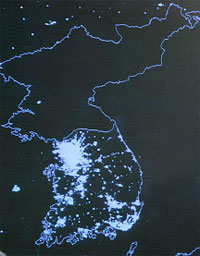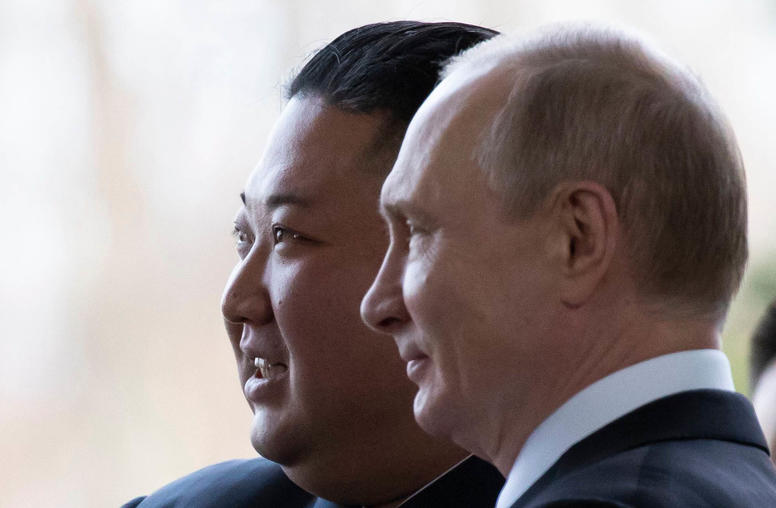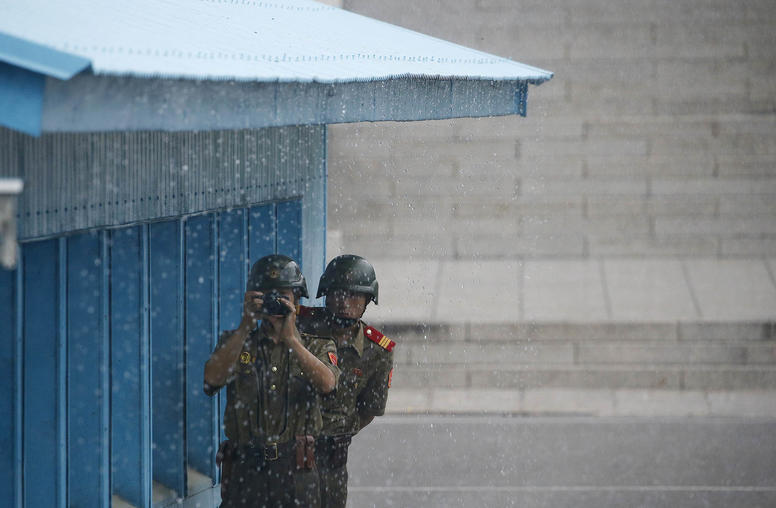USIP experts traveled to the Korean Peninsula for a pair of conferences co-convened by USIP's Center for Mediation and Conflict Resolution. The discussions addressed rising tensions in the region and explored ways to reduce risk and build confidence between the parties.
USIP experts traveled to the Korean Peninsula for a pair of conferences co-convened by USIP's Center for Conflict Analysis and Prevention . The discussions addressed rising tensions in the region and explored ways to reduce risk and build confidence between the parties.
5th Trilateral Dialogue in Northeast Asia Track 1.5 Conference
January 17-18, 2011
USIP’s Center for Conflict Analysis and Prevention (CAP) co-convened the 5th “Trilateral Dialogue in Northeast Asia” (TDNA) conference from January 17-18, 2011 in Seoul, Korea. The three partner organizations — USIP, South Korea’s Institute of Foreign Affairs and National Security (IFANS), and Japan’s Institute for International Policy Studies (IIPS) — led delegations consisting of foreign ministry, State Department, defense ministry, and Defense Department officials; White House and Blue House officials; Diet and National Assembly officials; and policy experts from their respective countries. The heads of delegation were Abiodun Williams, CAP Vice President, Amb. Lee Joon-gyu, Chancellor, IFANS, and Mr. Yachi Shotaro, IIPS Vice President and former Japanese Vice Foreign Minister. First Vice Foreign Minister Shin Kak-soo of South Korea gave the opening day address.
Initiated by USIP in 2008, TDNA seeks to foster the development of policy ideas and approaches through recurring Track 1.5 dialogue on common challenges and opportunities in Northeast Asia and in the international community. Building on four earlier rounds of trilateral Track 1.5 dialogue, this unique TDNA partnership has facilitated sustained policy engagement on pivotal chronic issues affecting Washington, Tokyo, and Seoul. Together, the TDNA partners continue to promote a policy dialogue mechanism that is nonpartisan, flexible, and sustainable. TDNA serves as a ‘policy R&D’ forum where an exchange of perspectives increases mutual understanding and informs the development of policies.
Williams, head of the USIP-led U.S. delegation, gave welcoming and closing remarks. Colonel Paul Hughes (ret.), director of special projects at USIP, was a speaker on the panel on nuclear security, where he gave a briefing on the USIP-facilitated Strategic Posture Commission’s report. John Park, who directs CMCR’s Northeast Asia projects, chaired the panel on how the trilateral partners are assessing and interacting with a rising China.
Derek Mitchell, Principal Deputy Assistant Secretary of Defense for Asian and Pacific Security Affairs, was the U.S. keynote speaker at the public symposium portion of the two-day conference — a public diplomacy initiative of the TDNA project. Titled “ROK-U.S.-Japan Trilateral Cooperation as a Catalyst for Global and Regional Governance,” the public symposium also included Japanese and South Korean keynote speakers —Shiozaki Yasuhisa, Member of the House of Representatives, Liberal Democratic Party and former Chief Cabinet Secretary, Kitaoka Shinichi, Professor, University of Tokyo and former Japanese ambassador to the United Nations, and Chung Ok-Nim, Member of the National Assembly, Grand National Party.
Park, TDNA co-director, will be coordinating with his South Korean and Japanese counterparts on plans for the 6th TDNA Track 1.5 conference. The next conference is scheduled to take place in Tokyo in late 2011.
Risk Reduction and Confidence-Building on the Korean Peninsula: Challenges, Opportunities, and Implications for Regional Stability
January 19, 2011
 On January 19, USIP’s Center for Conflict Analysis and Prevention (CAP) co-convened a conference titled “Risk Reduction and Confidence-Building on the Korean Peninsula: Challenges, Opportunities, and Implications for Regional Stability.” The other co-organizers were the Institute for Foreign Policy Analysis (lead organizer) and the Institute of Foreign Affairs and National Security. This one-day conference took place against the backdrop of Chinese President Hu Jintao’s visit to the United States where stabilizing the Korean Peninsula was a core focus of the summit agenda. The Honorable Hyun In-taek, South Korean Minister of Unification, was the main keynote speaker.
On January 19, USIP’s Center for Conflict Analysis and Prevention (CAP) co-convened a conference titled “Risk Reduction and Confidence-Building on the Korean Peninsula: Challenges, Opportunities, and Implications for Regional Stability.” The other co-organizers were the Institute for Foreign Policy Analysis (lead organizer) and the Institute of Foreign Affairs and National Security. This one-day conference took place against the backdrop of Chinese President Hu Jintao’s visit to the United States where stabilizing the Korean Peninsula was a core focus of the summit agenda. The Honorable Hyun In-taek, South Korean Minister of Unification, was the main keynote speaker.
This closed one-day conference explored ways to reduce risk (including reducing proliferation risks) and build confidence on the Korean Peninsula. Participants included policymakers and subject matter experts from the United States, South Korea, and China.
The conference’s primary goals were to:
- map the current security environment in Northeast Asia in the wake of the Cheonan incident, the shelling of Yeonpyeong Island, and leadership changes in Pyongyang, including options for reducing risks and strengthening deterrence over the near- and mid-term;
- consider the priorities and opportunities for revamping crisis management and related security arrangements to enhance stability on the Korean Peninsula;
- identify realistic strategies for countering North Korean nuclear capabilities and proliferation potential via bilateral, trilateral, and wider multilateral mechanisms; and
- discuss how a potential new security structure in Northeast Asia could help to create and sustain conditions conducive to a lasting peace regime on and around the Korean Peninsula.
Explore Further
- Center for Conflict Analysis and Prevention
- Trilateral Dialogue in Northeast Asia
- Countries and Regions: Korean Peninsula
- Read about the Cheonan incident in John Park's "On the Issues: The Sinking of South Korea's Naval Vessel"



